My neighbor leaned over the fence at me. “Where’s your brown duck? I haven’t seen her in the last few days.”
“Uh…she’s around,” I said.
“Are you sure? I haven’t seen her lately and I’ve really looked.”
“Well, I locked her up last night and let her out this morning, so, she’s somewhere.”
But then of course, when I went to look for Minkie, the brown duck, she was nowhere to be found.
We lost our first female duck to raccoon predation not long after we adopted her, so I’m pretty jumpy about protecting my ducks. I looked everywhere for Minkie, but she was nowhere to be found. I looked under the bushes, behind the hedge and up and down the street in case she had escaped.
Nothing. My duck was missing. Poof! Gone.
And then, that evening, there she was, waddling over to the pond, scarfing down some grain.
“Huh. Weird,” I thought.
Homebrew Husband suggested she was hiding from Jake the Drake and his unceasing, aggressive humping. A reasonable guess. But that evening our gang of ducks went into their little duck pen and I didn’t think too much more about it.
The next day, we let out the ducks and I soon noticed Minkie was….gone. “She’s got her own thing going,” said my husband, but secretly I could tell he was worried because he got mad the other ducks wouldn’t tell him where Minkie was.
That night, Minkie was nowhere to be found. Visions of raccoons danced in my head as dusk came and went. My daughter and I scoured the yard and surrounding neighborhood with flashlights, looking for our lost duck.
“Well,” I said to my daughter, “there’s three options, none of them good.”
“What are they?” she asked.
“She’s run away, and is going to get eaten. She’s lost, and is going to get eaten, or she’s hiding, and is going to get eaten.”
This did not look good for Minkie. But the next day, she was back, waddling and swimming and scarfing grain. This was truly the curious case of the missing duck.
The mystery might have gone on like that for weeks, with long Minkie disappearances and our ensuing nighttime anxiety, had I not come around the corner of my house happened to glance at just the right spot at just the right angle to see this.
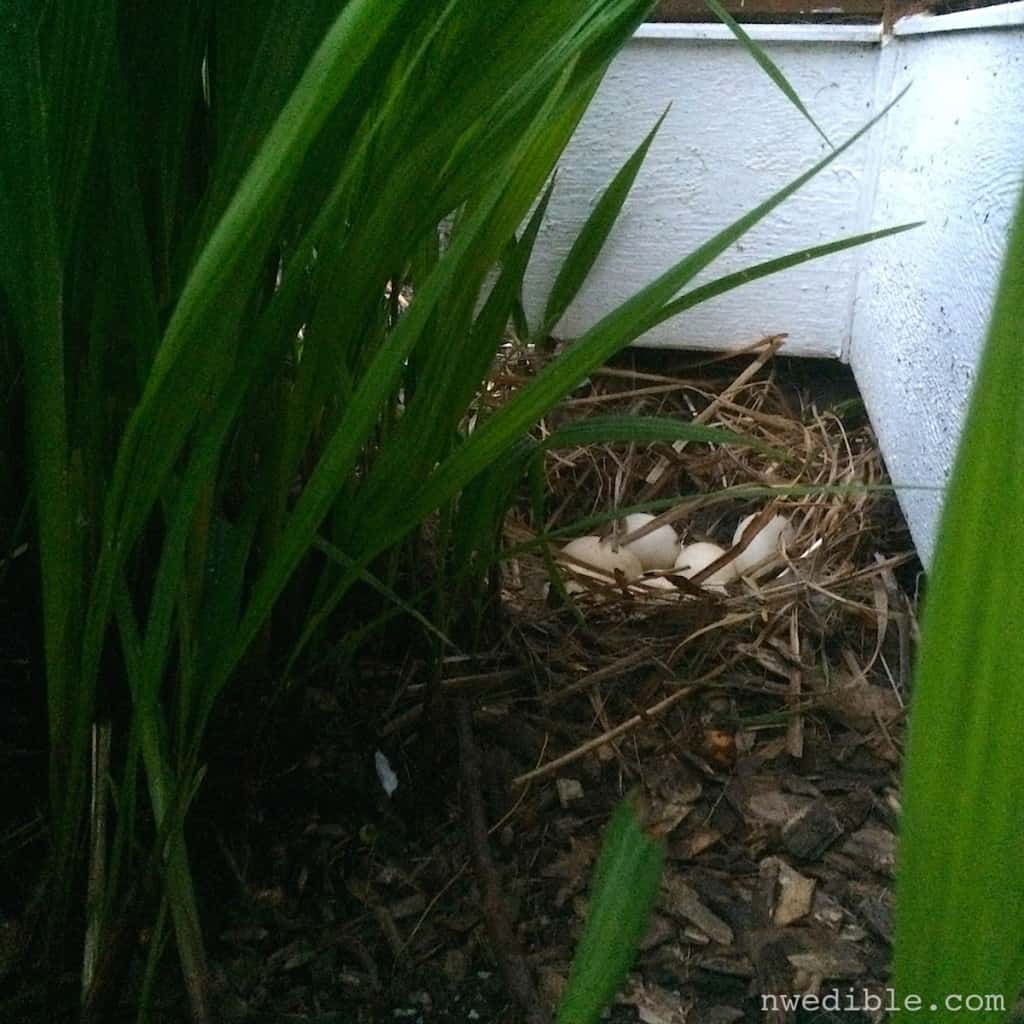
Wait, is that a….nest?
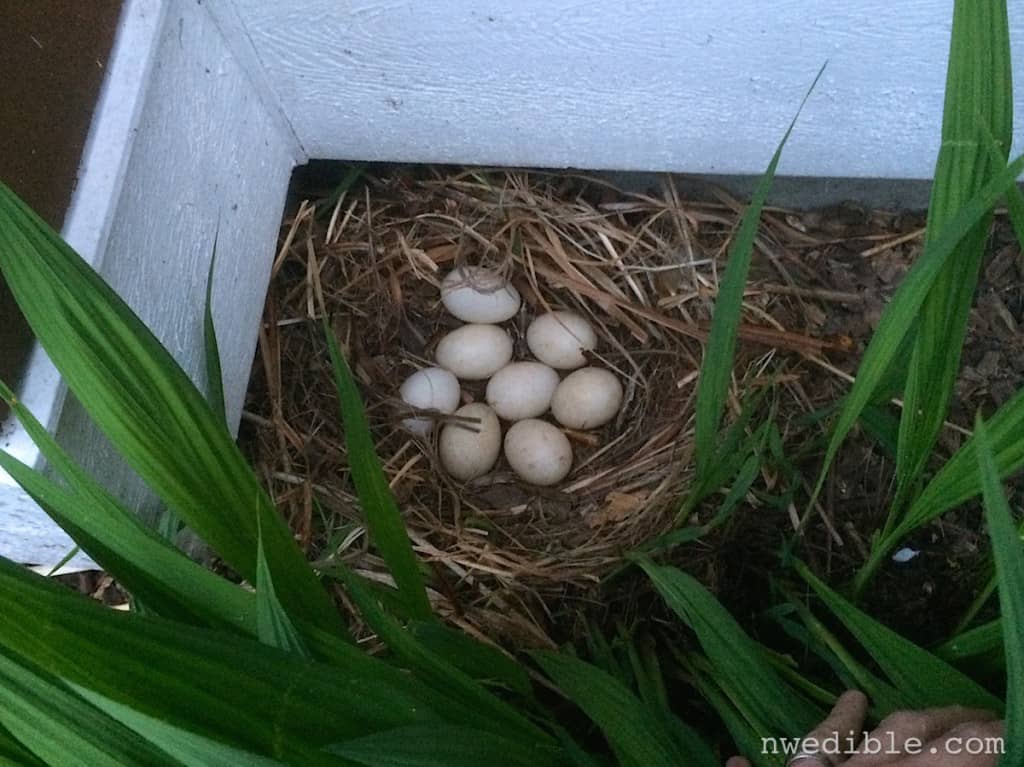
Oh yeah, definite and deliberate nest. Did you know ducks could make such awesome nests? I sure didn’t! It looks like a soft little basket.
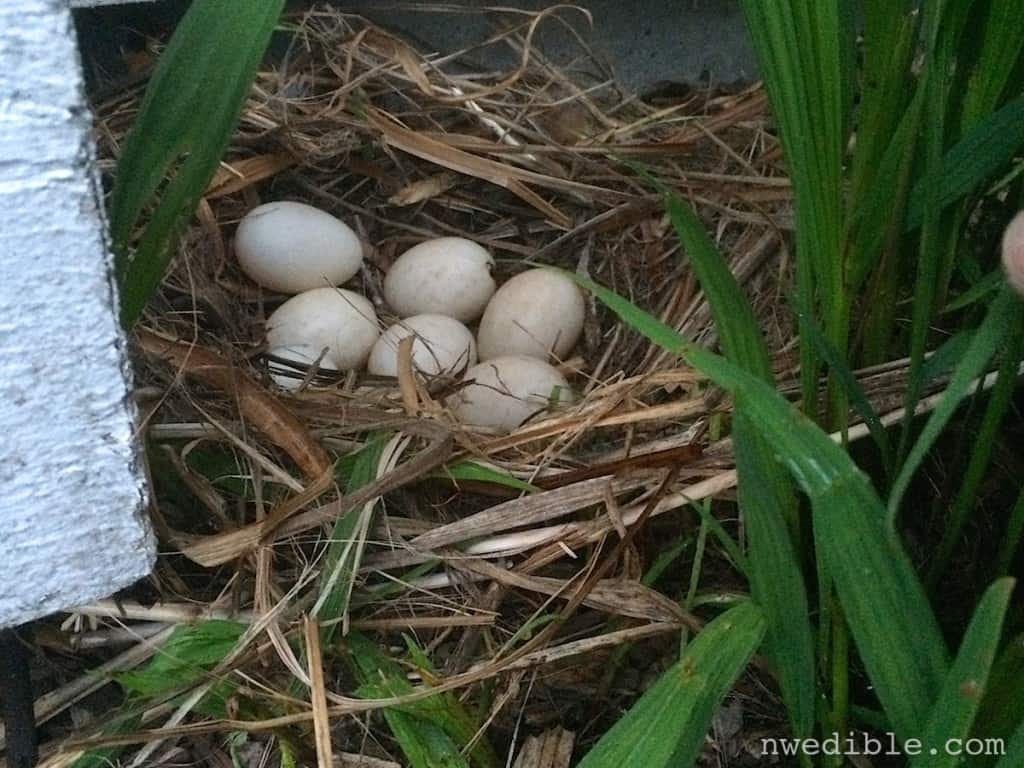
When we checked in a bit later, Minkie was settled in nicely.
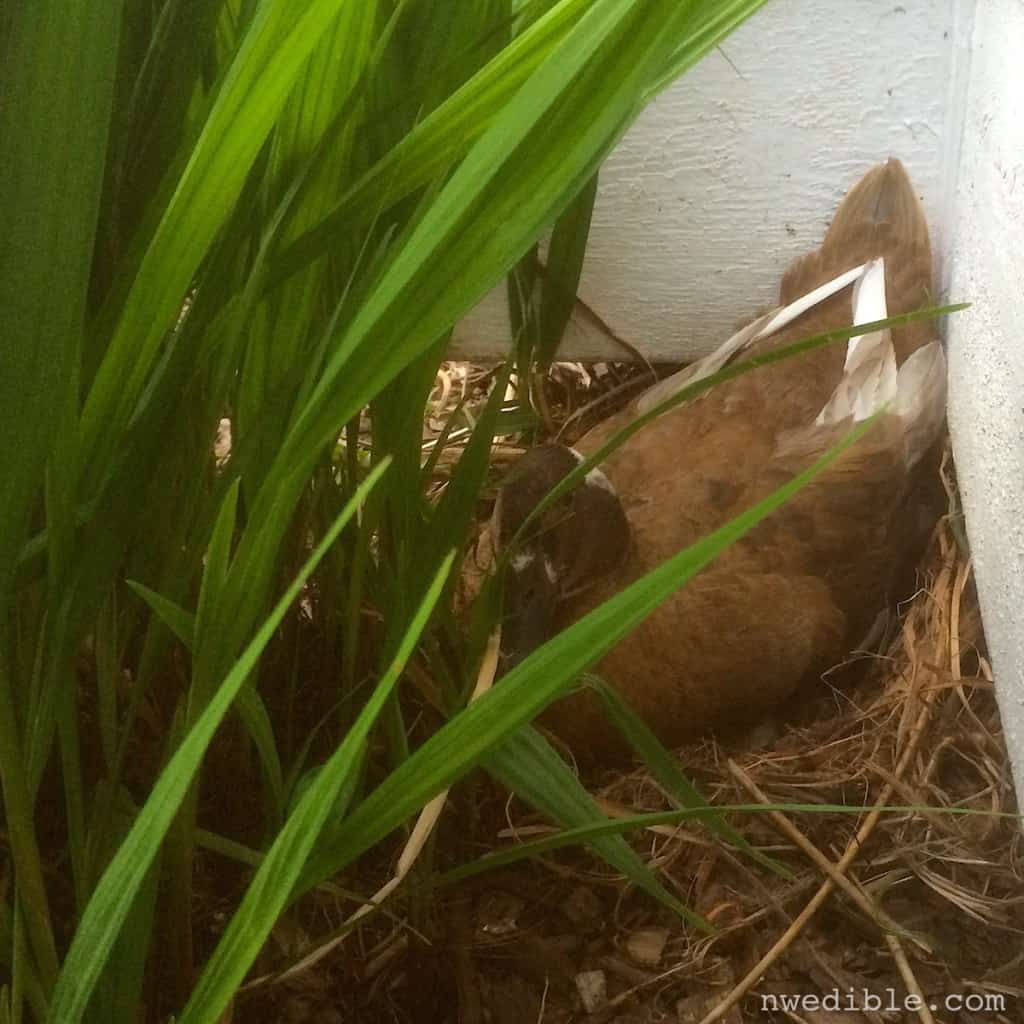
I know my yard pretty well, and I managed to not see her on this nest while looking for her, at least 3 times. It’s shocking how well hidden she is.
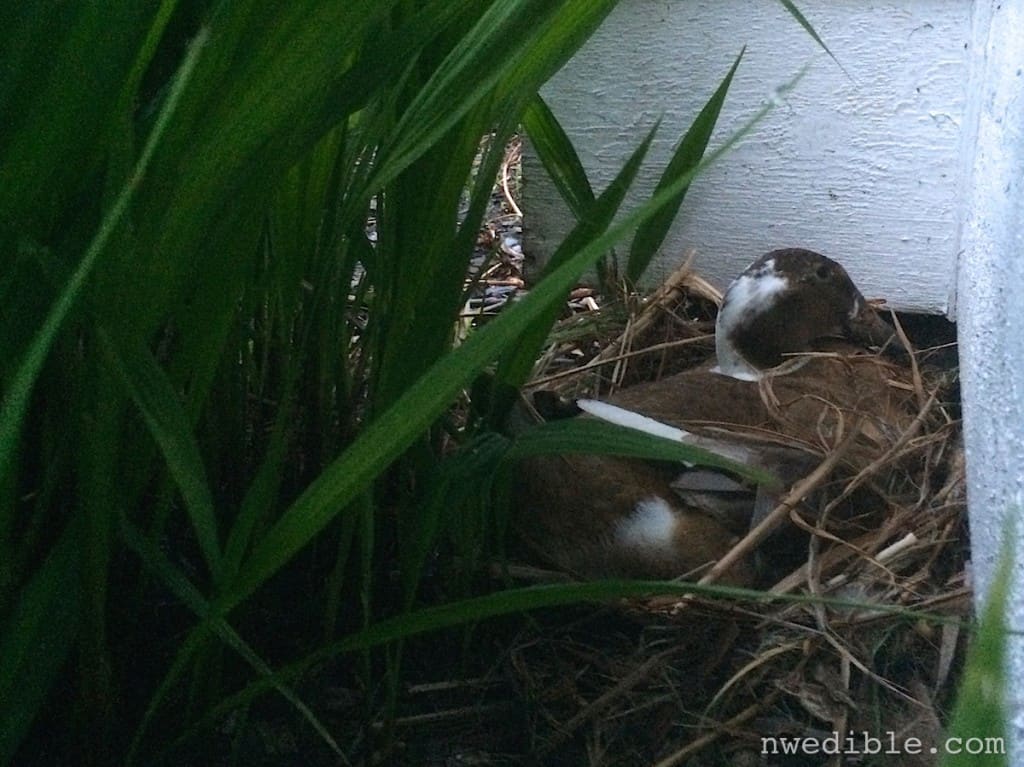
She’s now spending most of the day and night on this nest, sitting her clutch.
Mystery solved! Minkie just wants to be a mama.
Honestly, I’m thrilled. I’ve been going back and forth about getting additional duckings for 6 weeks. I swore to you (my keep-me-honest-readers!) that there would be No New Animals in 2015, but if the animals make more animals, I’m not going to argue.
So, a question – given that we want Minkie to be able to sit her clutch, and given that we have raccoons and other predators around, would you build a more secure enclosure around her chosen nesting area? Or do you think that runs the risk of spooking her so much she might abandon her nest?
What would you do?
51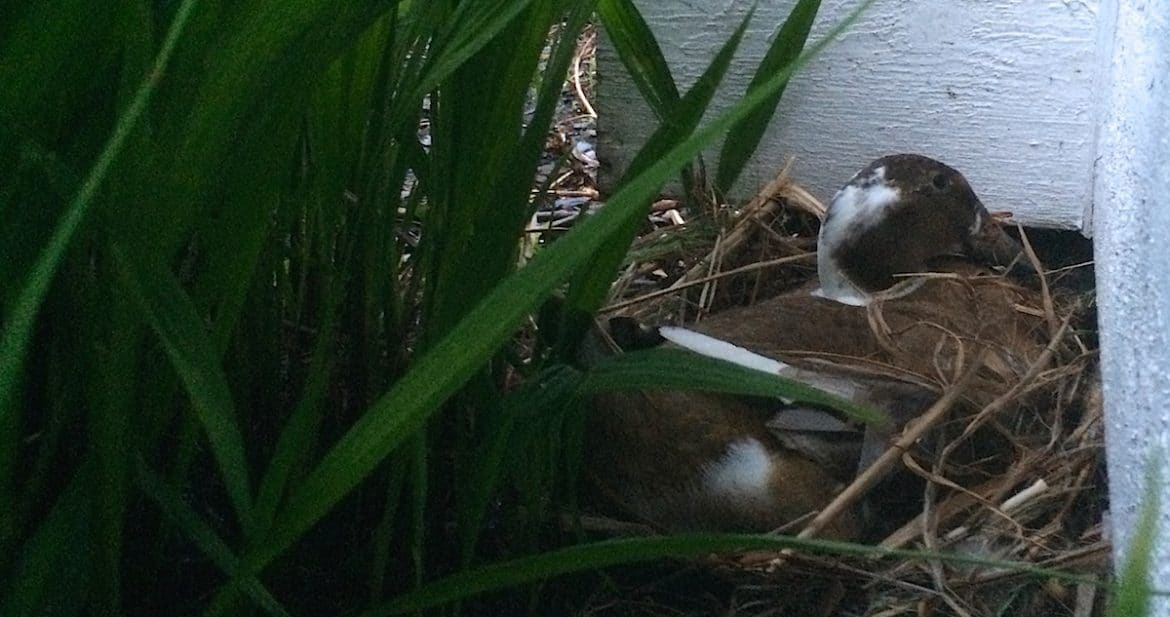
I don’t know about you, but every time I try to “help” something with my animals or garden, it turns out worse than if I had just let it be. Like this week when I transplanted half of my kale starts into my tree guild and sprinkled then with Sluggo. The chickens killed them in under half a hour because they waddled their fat butts all over them eat the Sluggo. After they knocked down the fence. I digress….
Your duck picked a spot that even you didn’t know about. I might consider letting nature take it’s course and cross your fingers.
Wild ducks manage it all the time without being seen. You didn’t notice her after looking. I think I’d just cross my fingers and hope for the best. Once they’re HATCHED, though, I’d take the entire family into protective custody at night for sure. 🙂
Baby ducklings!
I agree with Kyle. When we try to help it ends up worse…
If you leave them in place, perhaps use one or more predator pee products temporarily? Oh I know they wash away in our rain and that they are not humane products but just for now? Losing the duck babies would be so sad. Also an owl decoy might be a deterrent for a very short period – the predators become accustomed to these as well. Massive application of coffee grounds kept a local cat away for months after it got into our chicken run. FWIW
Well I know one thing we’ve got plenty of around here: coffee grounds!
Wild ducks manage it. She looks like she’s picked an excellent spot. Your backyard has to be less wild than the actual wild.
Put a drop cam there with a live feed to your website, it’ll be Duck Watch 2015!
I must say that, although wild ducks often manage it, sometimes they do not. Two years ago I kept finding a wild duck in our pond. I was really excited to finally have ducks (we had not started raising them yet). After much searching, I located the nest, took pictures, came by to visit it for a few days. And, then, POOF! No more eggs, no more duck. They hadn’t hatched; they just got eaten. I’d assume Mamma duck did, too, since I never saw her again. Wild ducks do get eaten–something has to feed those wild coyotes and racoons :(.
That’s not to say I have any solutions, especially since I’m new to duck-keeping. But, maybe set up a fence around her an the eggs and supply her with food and water in there? Since the nest is in the corner, it shouldn’t be too hard/expensive to put up a fence post or two and some chicken wire and hardware cloth. I don’t know how well deterrents (like music, or lights, predator pee) work in the city, as racoons are likely pretty desensitized to all of it out of survival necessity.
Duck Watch 2015!!! I second the notion, though if you put up a cam I’ll NEVER get anything done.
Baby ducks for the win! We just had one hatch out in the incubator, waiting on the second egg (we had massive issues with the thermostat for this hatch *sadness*) to hatch. Our house is filled with peeping. Ducklings are the best.
I’ve moved my ducks’ nests to more convenient, protected places in the past, and they’ve just settled back in to the new location with no drama. They always seem so insistent to nest that they’re determined to find the nest no matter what. But I have muscovies, if that makes a difference.
Our chickens were essentially free range. I think it saved them more times than not. One of our girls got broody the same way for about a month in a high raccoon traffic area, and she was never discovered.
Oh, now I’m just as nervous as you are! We were gifted a gosling many years ago, named him Goostaf and enjoyed his antics for a year until one day we found a giant egg in his sleeping quarters. We changed HER name to Goostafa and enjoyed large rich eggs for quite awhile and got in the habit of blowing out some of the eggs to fill with money and paint gold for special celebrations. Sadly, Goostafa got in the habit of not wanting to go to her secure sleeping “kennel” and one morning I found her decapitated. I’ve also found quail nests in tall grass full of eggs with mommy-not-to-be feathers everywhere. We do live a little more countrified than you, but I’m still nervous. Raccoons wear identify-concealing masks for a reason, and you know what they say about “sitting ducks”!
Erica, a no-brainer—grab her, gently collect her nest in a basket or box or some other nice thing, and put it in your night housing with some sort of concealing cover over it, so she feels protected. She will sit that nest. She’s committed now. I do this all the time.
I’d add some additional protection. We had a Muscovy sitting between the walls of our barn. After three weeks of sitting, she was snatched by a predator. She sat in the same exact place last year, and like you, I thought she was dead, but I’d see her every once in awhile, out to eat and drink. A month later, she reappeared in the barn with 13 ducklings!
It was heartbreaking to lose that sweet mama last week, but somehow my husband saved the majority of her eggs in a ghetto homemade incubator and eight hatched after a week a week in the house. Amazing miracle babies!! Do what you think is best, but I JUST went through this same thing and the outcome for that mama duck was not good. 🙁
I’d put some kind of temporary fencing around her area until ducks have hatched and grown enough to be really mobile. Raccoons are nasty critters that eat eggs, and chicks etc….and since we have altered the environment with homes etc. it is not as easy to find places to hide. If you want the babies you may need to give them some help. We live on 4 acres in the NE and right next to a national park. We have to trap raccoons sometimes to keep them from trashing our yard, bird feeders and nests and deck etc.
Good luck With your new family to be!
We’ve had really good luck with the red solar-powered blinking lights called Predator Eye, at least with our chickens and coyotes. I don’t know if the light would bother her or raccoons may be more aggressive than coyotes, but I’ve been impressed.
I’m no duck expert, but bigger predators aren’t the only thing you have to worry about with nests. Wild field mice and rats will sneak into nests (sometimes by digging up under a broody female) to eat eggs, though I’ve only personally seen such incidents with songbird nests. I would imagine a determined rat or Peromyscus could make it through a duck egg, though.
Every March, ducks disappear under our outbuilding and, every April, ducklings come out. Get ready. 😉
So adorable! I can’t wait to see the ducklings. Glad you found your Minkie!
A raccoon killed two of our ducks last year when my husband forgot to plug in the electric fence at night, so let me just say, I understand your worry about Minkie ending up as a coon dinner. However. I think messing with her at this point will freak her out too much. I agree with the sentiment: let nature take its course.
Actually, you know what I would do? I would put these eggs into an incubator. I am currently hatching seven duck eggs in an incubator I borrowed from a friend. This way, I have control over what’s going on, and the mama duck sleeps peacefully outside in her duck pen, protected by electric fence, which my husband now remembers to plug in, thank you very much!
Raccoons are smart creatures. My father-in-law had one trying to invade his chimney at his home in a neighborhood. He put up a trap baited with peanut butter and other savories. The raccoon got trapped the first night and escaped the trap by morning unseen. It happened again three more times.
My father-in-law liking a game, set the trap again with bait. Then sprung it, so the trap was shut. Overnight the raccoon broke into the trap, ate the bait, and broke back out again.
Short of building a house around the nest, I would guess that there is not much you could do to stop a determined raccoon.
We had good luck hatching out duck eggs under broody hens, if you have a hen broody somewhere safe that might be an option if you want ducklings & to keep your duck safe. It is also hilarious watching the mother hens when the ducklings take to the water for the first time, the scoldings & squarkings they give them when they are safely back on dry land are too funny. We had a bantam hen that was an amazing mum to several batches of ducklings & chooks of various many & varied breeds over her life time.
Awwww… I soooo hope you have ducklings! (Honestly, I would pay you for a little farm tour and bring my boys along to see them. Just planting a seed if you ever have interest in something like that. I very much understand why you may not…)
We had a broody runner duck. She hid and hatched one duckling that was snatched away in the daytime, probably by a hawk. The next time we tried to protect her and her little nest- ultimately she abandoned the nest because we were disturbing her too much by putting food and water into the protected enclosure. The next time we left her alone and she hatched six ducklings. We made sure to pen them up at night, because we also have raccoons and opossums. The ducklings grew up and were given to new homes. I’d recommend letting her do her thing.
make way for ducklings! ours did the same thing then 2 months later — 15 duckings 🙂
I would try to put the nest and the eggs in a dog cage and close the door at night otherwise it will be hard for me to sleep at night worrying about the mamma being eaten. She might not complain if the dog crate is right where she chose the nest to be. Also if you get one of those plastic ones the nest will be protected from the rain and weather And the eggs will have better chances to survive.
Just make sure it is slightly elevated in case of a heavy rain so it doesn’t get flooded.
Good luck
I do not own ducks but if I were in your shoes I would be ecstatic! If I had to think survival for that poor little duck…I might purchase an oversized dog crate and relocate the nest inside. At night you can get her inside the crate
and even cover her up with a night tent (sheet or something) and you could reinforce the crate with chicken wire on the outside if you feel predators could still get there little mitts on her and the nest through the holes. Also…I have heard that playing a radio at night may deter the predators..not sure but anything is worth a try. Oh..get a motion sensor night light..that oughta scare them off too. Best of luck too you and your “family to be”. Let us know what you decide. Ask around or check out your nearest thrift shop for the crate.
Hi, I’m with Susan on this one, scoop her, the babies AND her nest up and put her somewhere enclosed so that those evil duck-eating monsters can’t get at either her or the eggs, with a big bowl of water and favourite duck yumyum, they’ll all be safe, she can’t abandon them and you’ll sleep easy at night. Ducklings.. my idea of avian heaven.
I have Ancona’s too. Pick her and the nest up and put them in an enclosed space. I have a large dog kennel that I put in my duck house and close the other duck off from Mama. She will set as long as she’s not disturbed by the others. Let her have some time out in the mornings to forage and clean her feathers and she will raise those babies for you. I wouldn’t risk leaving her out like she is now!
One of the earlier comments said she was now committed and that held true for me. Wait till she’s off the nest, move it to where you want it, and then herd her back to it. Please keep us posted on how she does! Baby ducks are the cutest things going!
I agree that you should either move her or put her in a dog crate that can be closed at night. I have never moved a broody duck, but I have moved broody chickens. They will go right back to their old spot, even if there are no eggs, for the first day or two, unless they are confined to the new area. Then they seem to acclimate and when they get up to eat they come back to the new nest. I use a pet carrier to facilitate this change, which also gives me the ability to keep them safe at night. She will probably use the same nest when the babies are small, so the pet crate will make a nice dry spot for everyone.
Oh and by the way, I took your instructions and bought farm store chicks to give to a broody hen of mine, and she has adopted them just fine. Now I have some new genetics for my flock and I don’t have to raise them.
OK, there’s enough weigh-ins here for you to decide. Love Miss M enough to move the nest? or take a chance with nature…
Either way, I’m voting ‘Duck Cam’! 😀 Good Luck!
Whatever you decide, PLEASE let us all know what happens! Spring has Sprung!
I’ve moved broody chickens into more appropriate nests several times with no problems. I don’t know if it’s the same for ducks or not. If you already have a secure, handy place, I’d move her, the eggs and the nest at night. One person to grab the duck and hold her secure, one to scoop up eggs, nest and all. In my case, I was simultaneously changing out the eggs as well, switching fertilized eggs in for the sterile ones being tended. Hens haven’t ever noticed the switch.
I know several commenters have pointed out how well-hidden she already is, but I keep thinking of that old expression “… like a sitting duck”. An easy target.
GET A GOOSE
THEY PROTECT EVERYONE
Help! I have a mamma duck (I think mallard) sitting on her nest in my back yard, right next to my pool There are 11 eggs, she laid over the course of about 2 weeks. She started sitting on the nest 2 weeks ago, at first she wasn’t on it as much as I read she should be, sometimes she would be gone over night. She has started staying on it more, but now every afternoon about 4 or 5:00 she covers the nest and leaves and is gone for 3 or 4 hours, she comes back just as it is getting dark. Last night I heard her in the pool quacking about 10:00 and went to check to see if the pesky neighborhood cat was out there, she flew off and was gone all night and didn’t come back until about 6:00 this morning. The eggs were uncovered all night, temps were in the 50’s. I live in So Calif so the weather is nice and not too cool. But I’m concerned because this isn’t the first time she has been gone overnight. I have not interfered with nature’s course at all, I stay out of the backyard and away from the nest as much as possible, she doesn’t even like it when I look out the window to check on her. I’m concerned because if she gets scared off, the eggs are left uncovered for several hours and especially at night. I don’t have an incubator and don’t want to interfere, but want to protect her and babies. Should I be concerned when she is gone for so long? Will she notice if I go out and cover the eggs with her feathers? Need some advise. Thanks.
I just wanna see pictures of the ducklings when they hatch!